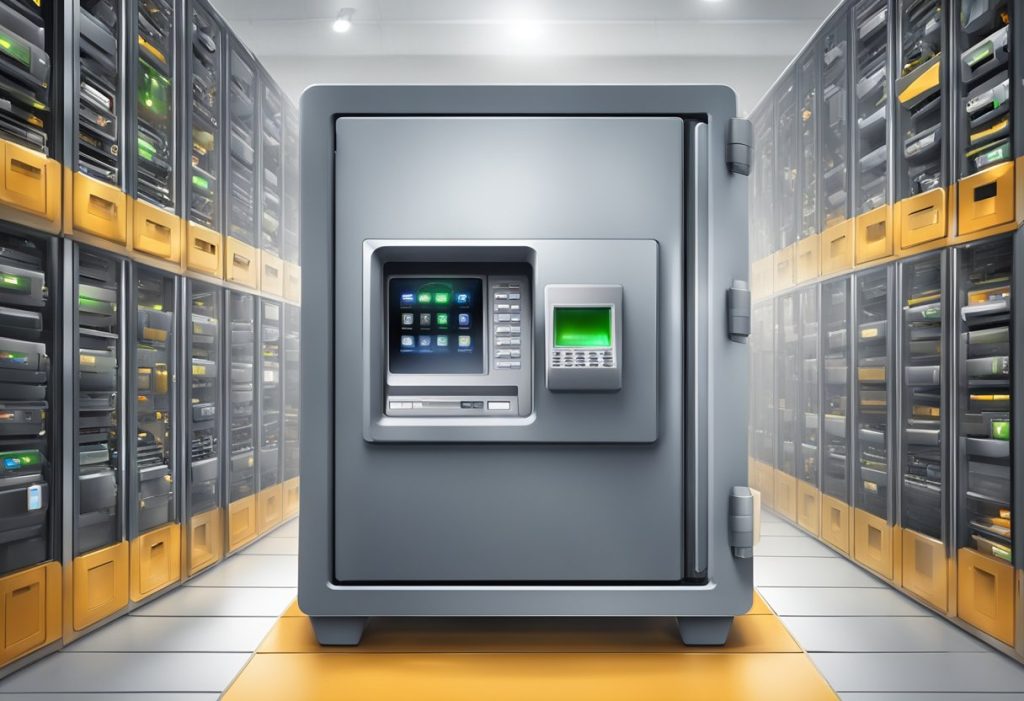Securing your cryptocurrency investments is of paramount importance in the ever-evolving digital landscape. As crypto assets are highly desirable targets for cybercriminals, finding the best secure storage solution is crucial for protecting your digital wealth. Crypto security means more than just setting a strong password; it involves multiple layers of protection, from the choice of storage to the ways you manage and interact with your assets.
Different types of crypto wallets offer varying levels of security, from hot wallets that are convenient for everyday use but more vulnerable, to cold wallets that provide the highest security for long-term storage. Understanding the nuances of each storage option and the security measures they entail can make a significant difference in safeguarding your assets. Additionally, staying abreast of new innovations in crypto storage technologies can offer more advanced security features, while adopting safe practices for everyday use can prevent common pitfalls that lead to asset vulnerability.
Key Takeaways
- Secure storage solutions are essential for cryptocurrency asset protection.
- Wallet choice, coupled with robust security practices, determines the safety of your crypto.
- Innovations in storage technologies continuously enhance crypto security options.
Understanding Cryptocurrency Security
When diving into the world of cryptocurrencies, your top priority should be to secure your digital assets. The landscape is fraught with risks and understanding the difference between storage solutions is essential for protection.
The Importance of Robust Security
Security of your crypto assets is not just important—it’s paramount. Robust security measures protect your digital wealth from unauthorized access, cyber theft, and unexpected loss. In the volatile crypto market, the security protocols you put in place are the vault walls around your investments. Most importantly, employing two-factor authentication (2FA) and keeping abreast with the latest security updates are essential steps in safeguarding your assets.
Assessing the Risks in Crypto Storage
The risks associated with crypto storage are several and varied. They range from hacking and phishing scams to lost keys and failed hardware. Your choice in a storage solution directly influences your risk level. Hot wallets, which are connected to the internet, offer convenience for everyday transactions but pose a higher risk due to their online nature. Conversely, cold wallets are offline and significantly less susceptible to online threats, though not without their physical risks such as damage or loss.
Defining Hot and Cold Storage Solutions
Understanding hot and cold storage solutions is crucial in choosing the right security measures. Hot wallets operate online and provide quick and easy access to your crypto assets, making them ideal for active trading and transactions. However, this convenience comes at a cost, making them more exposed to online threats. On the other hand, cold wallets are offline storage solutions like hardware wallets or paper wallets. They are considered the most secure method to store cryptocurrencies, particularly for long-term holdings, as they are much less vulnerable to hacking.
Types of Crypto Wallets

When you’re looking to secure your cryptocurrency, understanding the types of wallets available is crucial. Your choice can significantly affect the security and accessibility of your digital assets.
Comparing Hardware and Software Wallets
Hardware wallets are physical devices, often resembling a USB drive, designed to store your cryptocurrency offline, known as “cold storage.” This method is preferred for long-term storage due to its resilience to online hacking attempts. Prominent examples of hardware wallets include the Ledger Nano S and Trezor, which support a wide range of cryptocurrencies and are praised for their robust security features.
Among the various options available, Tangem Wallet stands out as the best solution for both security and convenience. Tangem combines the robust security of a hardware wallet with the ease of use of a software wallet. It is a card-shaped hardware wallet that is highly portable and user-friendly, making it ideal for both beginners and experienced users.
In contrast, software wallets are applications you can download to your computer or smartphone. These are “hot wallets” because they are connected to the internet, making them more convenient for daily transactions. Software wallets come as web, mobile, or desktop applications and offer a balance between ease of use and security. While they are generally secure, they are more susceptible to online vulnerabilities compared to hardware wallets.
The Role of Paper Wallets
Paper wallets are a form of cold storage. They consist of a physical document containing your public and private keys, usually in the form of QR codes. The main advantage is that your keys are stored offline, making them immune to online hacking. However, they are not without risks — they can be easily damaged or lost, and if not generated in a safe, offline environment, they can be susceptible to malware. Paper wallets require a very high level of care and are often used by those looking for an ironclad method of long-term storage for their digital currencies.
Setting Up a Cryptocurrency Wallet

Before engaging in any cryptocurrency transactions, you need a secure place to store your assets. Setting up a cryptocurrency wallet is the cornerstone of your digital asset security, involving careful selection and strict backup practices.
Choosing Your Wallet
Your choice in wallets can substantially influence your crypto assets’ safety. Hardware wallets, like the ones mentioned by Forbes Advisor, offer robust security features and are essential for holding large amounts of cryptocurrency securely. A software wallet, while more convenient for transactional purposes, should be chosen with strong security features in mind, including multi-factor authentication and private key encryption.
Remember, the private keys are what give you access to your crypto; thus, a wallet that keeps your private keys offline and controlled solely by you is preferable.
Backup and Recovery Protocols
Securing your wallet includes more than choosing the right storage—it demands rigorous backup and recovery protocols. The seed phrase, a series of words generated by your wallet, is vital for backup and recovery. Write this phrase down and store it in multiple, secure locations. Never share your seed phrase with anyone.
It is critical that you test the backup process to ensure you can recover your wallet if needed. Maintain a strict routine where backups are consistently updated, especially if you create new addresses or conduct frequent transactions.
Your proactive steps in setting up and maintaining your cryptocurrency wallet will set a foundation for secure management of your digital assets.
Advanced Security Measures
In the realm of cryptocurrency, securing your digital assets is paramount. Advanced security measures such as two-factor authentication and robust encryption are critical to safeguarding your funds against unauthorized access and potential cyber threats.
Leveraging Two-Factor Authentication
Two-factor authentication (2FA) adds an extra layer of security to your crypto storage solutions. When you enable 2FA, you must provide two different authentication factors to verify yourself. This typically involves something you know, like a password, and something you have, such as a code from a mobile app or a text message. Be sure to enable 2FA on all platforms that offer it, as this significantly decreases the chances of your accounts being compromised.
Understanding Encryption and Passphrases
Encryption is a process that converts your data into a code to prevent unauthorized access. When you use encryption for your crypto assets, it ensures that your sensitive information, like private keys, is not accessible to others if intercepted. A strong passphrase provides additional security; this is a longer version of a password, typically containing a sequence of words or characters that create a barrier against brute-force attacks. Remember that your passphrase is only as secure as you make it—avoid common phrases and include a mix of letters, numbers, and symbols.
Hardware Wallets Explained
Hardware wallets, also known as cold storage, provide robust security for your cryptocurrency assets by storing your private keys offline. They are considered one of the most secure methods to hold cryptocurrencies as they minimize the risks associated with internet-connected wallets.
Trezor Wallets Overview
Trezor, a pioneering hardware wallet brand, offers models like the Trezor Model T which is notable for its touchscreen interface and support for a wide array of cryptocurrencies. Your Trezor wallet acts as a multi-currency vault with advanced security measures to ensure that your digital assets remain safe even when connected to a compromised computer.
Ledger Wallet Options
Ledger’s range includes popular models such as the Ledger Nano S, Ledger Nano X, and the latest, Ledger Stax. These wallets are known for their ease-of-use and a sturdy build, securing assets with a unique PIN code and backup features. The Ledger Nano S Plus serves as a budget-friendly option while the Nano X caters to those seeking more convenience with its Bluetooth connectivity feature.
Evaluating Other Hardware Wallets
Aside from Trezor and Ledger, other hardware wallets like the Ellipal Titan 2.0 and KeepKey also provide dependable cold storage solutions. The Ellipal Titan 2.0 is distinguished by its air-gapped security, meaning it never needs to connect to an internet-enabled device, while KeepKey scores points for its sleek design and an intuitive interface. When considering various hardware wallets, look for key security features such as PIN protection, passphrase support, and recovery options to maintain control over your Bitcoin wallet and other digital currencies.
Cold Wallets and Cold Storage Techniques
When exploring the realm of cryptocurrency security, you’ll encounter the concepts of cold wallets and cold storage techniques. These methods are paramount in ensuring the safety of your digital assets from online threats.
The Concept of Deep Cold Storage
Deep cold storage refers to the process of storing cryptocurrencies in a wallet that is not connected to the internet and is often securely stashed in a physical location. The primary advantage here is reducing the risk of online hacking attempts. Deep cold storage can involve paper wallets or hardware devices, which you might keep in a bank vault or another secure location to mitigate risks of theft or physical damage.
- Paper Wallets: Store your private keys on a physical piece of paper which you can keep safe.
- Hardware Devices: Use devices designed like USB drives but with enhanced security measures.
Air-Gapped Wallet Security
An air-gapped wallet operates on a device that has never been connected to the internet. Therefore, your wallet remains isolated from online vulnerabilities. Here’s how to maintain the security of an air-gapped cold wallet storage:
- Regular Checks: Periodically verify the physical integrity of your device to prevent damage.
- Secure Backup: Always have a secure backup of your recovery phrase that is equally protected.
By utilizing air-gapped wallet security, you’re adding a strong layer of defense against digital threats while acknowledging the importance of safeguarding against potential physical damage. Hardware cold wallets like the ELLIPAL Titan and Ledger Stax are examples of devices that offer this kind of protection.
Protecting Your Digital Assets
Securing your cryptocurrencies is crucial in an environment where hacking attempts and scams are prevalent. A robust security protocol ensures the safety of your digital assets.
Safeguarding Against Hacks and Scams
To protect yourself from hacks and scams, it’s essential to implement multiple layers of security. Two-factor authentication (2FA) is a cornerstone in your defense strategy, providing an additional verification step whenever access to your accounts is attempted. Regularly updating and creating complex passwords for wallet and exchange accounts is no longer optional; it’s a necessity.
For added security, consider using a hardware wallet. Hardware wallets such as Ledger or Trezor provide offline storage, keeping your private keys out of the reach of online hackers. Remember to never share your private keys or seed phrases with anyone, and be wary of phishing websites that masquerade as legitimate services aimed at stealing your information.
Insurance and Physical Safeguards
Having insurance for your digital assets can provide a safety net in the unfortunate event of loss due to security breaches. Some wallets and exchanges offer insurance policies to protect against specific types of risk. When selecting a service, ensure they have a policy in place to know your investments are backed by additional protection.
Physical security measures also play a crucial role. Store backup copies of your seed phrases or private keys in secure locations such as bank vaults or personal safes. These physical copies should be encrypted or written in a way that only you can understand or access, ensuring that even if they are discovered, your assets remain secure.
Cryptocurrency Exchanges and Wallets
In the dynamic world of digital assets, knowing the ins and outs of how to store your cryptocurrency safely is essential. You’ll encounter terms like exchange-based wallets and independent wallets, along with considerations such as custodial vs. non-custodial solutions.
Exchange-Based Wallets vs. Independent Wallets
When you first dip your toes into cryptocurrency trading, you may notice that many exchanges provide integrated wallets — known as exchange-based wallets or hot wallets — for a streamlined experience. These wallets are convenient for active traders, offering ease of use when it comes to wallet addresses and transactions. However, an independent wallet, often software or hardware-based, provides you with direct control over your security keys and, consequently, your funds. Independent wallets are not tied to a specific exchange and can range from mobile applications to sophisticated hardware devices.
Understanding Custodial vs. Non-Custodial Solutions
A custodial wallet means that a third party, typically an exchange, manages the private keys associated with your cryptocurrency wallet. This approach is akin to banking; you trust an institution to safeguard your funds. While this can offer more recovery options if access information is forgotten, it also means your cryptocurrency is under the control of that institution. Conversely, non-custodial solutions, where you alone possess the private keys, provide full autonomy over your digital assets. This requires a greater responsibility for security on your part but ensures that you have exclusive access to your funds.
Choosing between custodial and non-custodial options comes down to your preferences for security versus convenience, and your willingness to manage the risks associated with trading and storing cryptocurrency.
Investment Strategies and Wallet Organization
Properly strategizing your investment approach and organizing your wallets are essential to protecting your crypto holdings. Whether you’re a long-term investor or looking for short-term gains, the way you store and access your cryptocurrency can significantly impact your investment’s safety and success.
Strategizing for Long-Term vs. Short-Term
Long-term storage solutions are paramount if you aim to hold cryptocurrencies for extended periods. Investors should consider cold storage options, such as hardware wallets or paper wallets, which offer security from online threats. The Ultimate Guide to Safely Storing Cryptocurrencies suggests using two-factor authentication and robust security routines for any wallet type.
For short-term investing, accessibility is key. Software wallets or online services that offer quick transactions and easy access can be beneficial. However, it is vital to manage these wallets with the same level of security attention as the long-term options, by ensuring that strong authentication methods are in place.
Organizing Wallets for Optimal Accessibility
Organizing your wallets effectively can enhance your investing efficiency. Split your crypto holdings between different wallet types:
- Hot Wallets: Convenient for regular trading and small amounts of cryptocurrency.
- Cold Wallets: Best for large amounts of assets that you plan to hold and not access frequently.
By diversifying storage methods, you mitigate risk and enhance organization and accessibility. The Ultimate Crypto Wallet Guide: Top 6 Secure Storage Solutions discusses the efficacy of having multiple wallets to secure your investments better. Furthermore, labeling wallets according to their purpose, such as “trading,” “savings,” or “checking,” can help you stay organized and make access more intuitive.
Innovations in Crypto Storage Technologies
Keeping your digital assets secure is of utmost importance in the ever-evolving world of cryptocurrency. Cutting-edge innovations in storage technologies now offer advanced security features, leveraging blockchain and wallet integration, along with the convenience of Bluetooth connectivity and smart contracts.
The Emergence of Bluetooth and Smart Wallets
The convenience of managing your crypto assets has significantly improved with the introduction of Bluetooth-enabled smart wallets. These devices allow you to connect wirelessly to your smartphone, enabling secure transactions without the need for cumbersome cables. For instance, the Ledger Stax has redefined what it means to have a secure crypto storage, with its wireless communication capabilities consequently raising the bar for wallet technology. With these wallets, you can verify transactions on your wallet’s display and confirm them directly on your mobile device, ensuring that security is not compromised for convenience.
Blockchain and Wallet Integration
The integration of blockchain technology into wallet solutions has paved the way for more secure storage options. Wallets that incorporate the safety of cold storage with the dynamic functionality of the blockchain can provide you safekeeping for your assets, with the enhanced security of offline storage. For example, IBM has recently introduced a new cold storage technology, the IBM Hyper Protect Offline Signing Orchestrator, designed to maximize security for crypto assets by using blockchain to ensure transparency and tamper-proof record-keeping. Such integration also paves the way for the inclusive use of smart contracts in wallet technology, offering you automated, self-executing contracts that are stored on the blockchain and add layers of security and functionality to your crypto transactions.
With these advancements, your crypto assets are more secure, backed by the immutable nature of blockchain technology, and are accessible through innovative touchpoints like Bluetooth connectivity.
Safe Practices for Everyday Crypto Use
Engaging in daily transactions with cryptocurrencies requires a commitment to security without sacrificing convenience. Here are essential practices you should adopt to protect your crypto assets and maintain your privacy.
Detecting Phishing and Malware
Be vigilant about phishing attempts and potential malware. Always verify the authenticity of websites before entering sensitive information. Websites claiming to offer easy crypto earnings can be traps. Look for HTTPS in the URL and beware of misspelled domain names. Emails and messages that prompt action regarding your assets should be treated with suspicion—double-check the sender’s details and avoid clicking on unsolicited links. Anti-virus software can be a crucial tool in identifying and thwarting malware that could compromise your cryptocurrencies.
Secure Transaction Methods
When conducting transactions, opt for user-friendly interfaces that don’t compromise on security. Utilize wallets with two-factor authentication (2FA) to enforce an additional security layer. For better security and privacy, use hardware wallets or cold storage methods, especially for substantial amounts of crypto assets. When transferring funds, verify the recipient’s address carefully. For face-to-face transactions, use QR codes rather than manually entering addresses to prevent errors and ensure privacy. Remember, any mistake in a transaction can be irreversible and costly.
Frequently Asked Questions
Selecting the right crypto storage solution is crucial to ensure the safety of your assets. It’s important to understand various options and their associated security features.
What are the top-rated secure crypto storage solutions on the market?
The market offers a range of secure storage solutions, including hardware wallets like Ledger and Trezor, and encrypted cloud storage services reviewed as secure. These options are known for their robust security protocols.
Which crypto wallets are best suited for beginners seeking security and ease of use?
For beginners, wallets that combine security with ease of use are paramount. Brands like Coinbase offer user-friendly interfaces while ensuring adequate safety measures to protect digital assets.
What strategies are recommended for long-term cryptocurrency storage?
Long-term storage calls for strategies reducing online threats; many experts advise using hardware wallets or paper wallets. Using multiple wallets to diversify risk is also a common practice.
Can you list some of the most secure cold wallets available today?
Renowned for their security, Ledger and Trezor are among the most secure cold wallets. These physical devices keep cryptocurrencies offline and are immune to online hacking attempts.
What should one look for in a crypto wallet app to ensure maximum security?
When choosing a crypto wallet app, prioritize features like two-factor authentication, multi-signature support, and a transparent security protocol. Opt for wallets that have a consistent track record of security and positive user reviews.
How does one effectively store cryptocurrency offline to safeguard against online threats?
Storing cryptocurrency offline, often termed ‘cold storage,’ involves keeping private keys in hardware wallets or paper wallets that are not connected to the internet, thus protecting them from online threats.

























 Bitcoin
Bitcoin  Ethereum
Ethereum  Tether
Tether  XRP
XRP  USDC
USDC  Solana
Solana  TRON
TRON  Lido Staked Ether
Lido Staked Ether  Dogecoin
Dogecoin  Figure Heloc
Figure Heloc  WhiteBIT Coin
WhiteBIT Coin  Cardano
Cardano  USDS
USDS  Bitcoin Cash
Bitcoin Cash  Wrapped stETH
Wrapped stETH  LEO Token
LEO Token  Hyperliquid
Hyperliquid  Wrapped Bitcoin
Wrapped Bitcoin  Monero
Monero  Binance Bridged USDT (BNB Smart Chain)
Binance Bridged USDT (BNB Smart Chain)  Chainlink
Chainlink  Canton
Canton  Ethena USDe
Ethena USDe  Stellar
Stellar  Wrapped eETH
Wrapped eETH  USD1
USD1  Rain
Rain  sUSDS
sUSDS  Hedera
Hedera  Litecoin
Litecoin  Dai
Dai  Coinbase Wrapped BTC
Coinbase Wrapped BTC  PayPal USD
PayPal USD  Avalanche
Avalanche  Zcash
Zcash  WETH
WETH  Sui
Sui  Shiba Inu
Shiba Inu  Cronos
Cronos  USDT0
USDT0  Toncoin
Toncoin  World Liberty Financial
World Liberty Financial  Tether Gold
Tether Gold  MemeCore
MemeCore  PAX Gold
PAX Gold  Polkadot
Polkadot  Uniswap
Uniswap  Ethena Staked USDe
Ethena Staked USDe